The automotive industry is no stranger to competition. With advancements in technology and changing customer preferences, car dealerships and other players in the industry must continuously adapt to stay relevant. One of the crucial aspects of achieving success in this industry is through effective automotive marketing strategies.
There are several strategies and automotive marketing campaigns that can help vehicle professionals stay ahead of the competition. In this blog post, we’ll explore some of the most effective strategies in detail. But first, let’s start with understanding what automotive marketing is.
Table of contents
- What is automotive marketing?
- Importance of automotive marketing
- How to build a robust automotive marketing plan
- 13 effective automotive marketing strategies
- 1. Search engine optimization (SEO)
- 2. Pay-per-click (PPC) advertising
- 3. Content marketing
- 4. Social media marketing
- 5. Referral marketing
- 6. Video marketing
- 7. Customer reviews
- 8. Business directory listings
- 9. Remarketing
- 10. Unique offers and promotions
- 11. Email and SMS marketing
- 12. Influencer marketing
- 13. Event marketing
- Frequently asked questions about automotive marketing
- Drive sales with automotive marketing
What is automotive marketing?
Automotive marketing refers to the various strategies and tactics used to promote and sell cars and related products and services. The primary goal of automotive marketing is to:
- Attract and retain customers
- Build brand awareness and loyalty, and
- Drive sales
Importance of automotive marketing
Effective automotive marketing can help businesses stand out from the competition and generate more leads and sales. By understanding the needs of their target audience and leveraging the right car dealership marketing strategies, automotive businesses can:
- Build a strong online presence
- Connect with potential customers, and
- Drive growth and profitability
How to build a robust automotive marketing plan
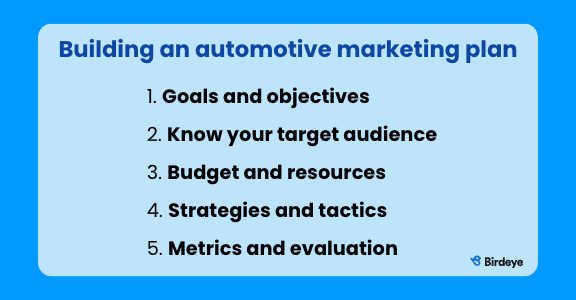
Developing a comprehensive automotive marketing plan is essential for businesses looking to succeed in the industry. Here are some of the key elements that should be included in an automotive marketing plan:
Goals and objectives
Before launching your plan, you should define clear goals and objectives that you want to achieve. These might include increasing brand awareness, generating more leads, or improving customer loyalty. By setting specific, measurable goals, you can track your progress and adjust your strategies to achieve desired results.
Know your target audience
Understanding your target audience is critical to developing an effective automotive industry marketing plan. This includes identifying their pain points and preferences, as well as their demographics such as age, location, and interests. By having an in-depth understanding of your target audience, you can tailor your marketing strategies to better solve their automotive needs and drive sales.
Budget and resources
By setting a budget and allocating resources effectively, you can ensure that you are making the most of your automotive marketing efforts. This includes identifying the resources you will need, such as staff, technology, and advertising platforms, as well as the costs associated with each.
Strategies and tactics
By developing a diverse marketing mix, you can reach your target audience through multiple channels and increase your conversion rates. This might include a combination of digital marketing tactics, such as search engine optimization (SEO), pay-per-click (PPC) advertising, and social media marketing, as well as traditional marketing tactics like direct mail and referral marketing.
Metrics and evaluation
Finally, your marketing plan should include clear metrics and evaluation criteria. This includes identifying key performance indicators (KPIs) that you’ll track to measure your progress and methods for evaluating the success of your campaigns. By regularly evaluating your marketing plan, you can identify areas for improvement and make data-driven decisions to optimize your efforts.
Once your automotive marketing plan is ready, it’s time to start with some strategies that make sense for your business. To get you going, here’s our list of 13 strategies that are proven to increase brand awareness and automotive sales.
13 effective automotive marketing strategies
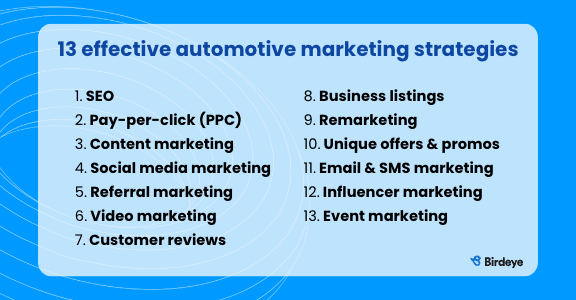
1. Search engine optimization (SEO)
SEO can play a critical role in automotive marketing by helping businesses improve their online visibility and attract more traffic to their website. By using targeted keywords and optimizing their website and content for specific audiences, businesses can attract more qualified leads. This can be especially important in the automotive industry, where customers have unique needs and preferences based on factors like their location, age, interests, and price.

2. Pay-per-click (PPC) advertising
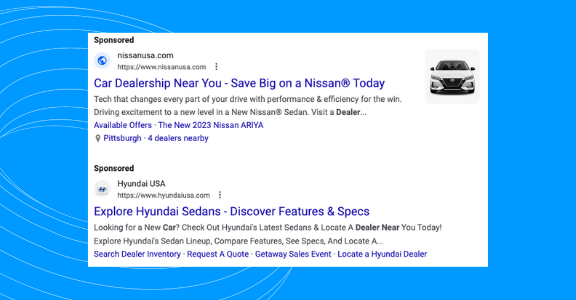
With PPC advertising, automotive businesses can target specific keywords and demographics to ensure their ads are shown to the right audience. Placing targeted ads on search engines and social media platforms can attract more qualified leads to their website faster and increase their chances of generating sales. It’s important to note that PPC requires a budget and should be carefully monitored to ensure maximum ROI.
3. Content marketing
Content marketing is an effective way for automotive businesses to increase website traffic and engage their audiences organically. Creating relevant content such as blog posts, videos, podcasts, or eBooks can help automotive businesses establish themselves as experts in their industry to build credibility toward their brand.
Additionally, sharing this content via email marketing and other digital channels can help them reach their target audience more effectively. Content marketing should be combined with SEO to ensure the content is indexed by search engines and reaches its intended audience.
4. Social media marketing
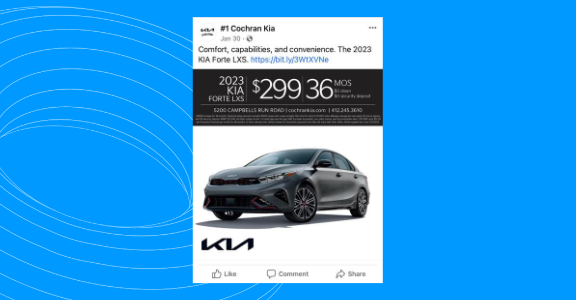
By creating engaging content and sharing it on social media, auto businesses can attract more followers, increase their reach, and establish themselves as thought leaders in the industry. By sharing user-generated content, responding to comments and messages, and running social media contests, dealers can foster stronger relationships with their customers and build loyalty.
Several social media management platforms offer paid advertising options which are often less expensive than traditional advertising methods. This can help you get in front of your target audience on platforms that they already frequent. Birdeye Social is a scalable platform to help you get the most from your social media marketing.
5. Referral marketing
Referral marketing is essentially word-of-mouth advertising, which can be incredibly powerful in the automotive industry. Consumers rely on recommendations from friends and family when making purchasing decisions, and a referral from a satisfied customer can be more effective than any other form of advertising.
The cost of acquiring a new customer through referrals is often lower than other forms of advertising. What makes this option even more attractive is the fact that the conversion rate of prospects who come in because of a referral is also much higher than those who discover a business through other channels. Birdeye’s referral marketing platform can make getting and managing referrals a breeze.
6. Video marketing
Video marketing allows businesses to tell visual stories that can be more engaging and memorable than other forms of advertising. By showcasing their products and services in action, businesses can help potential customers understand how their offerings can meet their needs and solve their problems.
Video marketing can also improve search engine rankings, as videos can be optimized for specific keywords and shared on social media and other platforms. By creating informative videos, businesses can establish themselves as experts in their field and build trust with their target audience.
Here are some examples of video marketing:
- Product demonstrations
- Customer testimonials
- How-to videos
- Behind-the-scenes videos
- Event coverage
- Influencer collaborations
7. Customer reviews
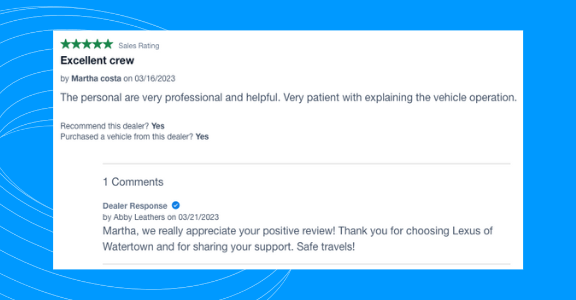
Customer reviews can help businesses build trust and credibility around their brand. Apart from Google reviews, reviews on other niche car review sites like cars.com, Edmunds, and DealerRater contribute significantly to your credibility with prospective buyers.
When potential customers read positive reviews from satisfied customers, they are more likely to trust the dealership and feel confident in their purchasing decision. Reviews can also improve search engine rankings, as search engines often prioritize businesses with high ratings and positive reviews.
Birdeye is the #1 reviews management platform that can help you automate review generation by integrating with your dealer or shop management software.
8. Business directory listings
Business listings management can help businesses appear higher on search engine results pages, which can increase online visibility and drive more traffic to their website. Having a well-optimized Google My Business profile, now known as Google Business Profile, is a great place to start. There are several other directory listings where your automotive business can be listed. Having a presence on various business directory listings can also improve search engine rankings, as search engines often prioritize businesses that are listed in multiple directories. Remember to keep your business information accurate across all listing sites. If you don’t, you run the risk of hurting your online reputation which affects search engine rankings.
9. Remarketing
Remarketing allows businesses to target customers who have already shown interest in their products or services by visiting their website, viewing specific pages, or adding items to their cart. It can be personalized to each individual customer, based on their behavior on the website.
Remarketing can lead to higher conversion rates, as customers who have already shown interest in a business are more likely to make a purchase when they are reminded of the dealership through remarketing ads. This can result in a higher return on investment and more efficient use of marketing budgets.
10. Unique offers and promotions
Offers and promotions can help businesses attract new car buyers who are interested in taking advantage of a special deal or discount. By creating a sense of urgency or incentivizing a purchase, dealerships can increase sales by encouraging customers to make a purchase they may have otherwise put off.
Some commonly used examples of offers include:
- Discounted maintenance services
- Cashback offers
- Trade-in promotions
- Free accessories
- Limited-time financing offers
11. Email and SMS marketing
Email and SMS marketing can be effective automotive marketing strategies for businesses looking to reach their target audience directly. By leveraging the power of personalized messaging and targeted communication, automotive businesses can improve the overall customer journey and achieve their marketing goals.
Here are some ways email and SMS marketing can be used for automotive businesses:
- Promoting new products and services
- Announcing special deals and discounts
- Providing maintenance reminders
- Requesting customer feedback
- Promoting events and promotions
- Offering personalized recommendations
- Delivering important updates
12. Influencer marketing
Influencer marketing can help automotive businesses reach new audiences who may not be familiar with their products or services. By teaming up with influencers who have a large and engaged following, businesses can expand their reach, attract new customers, and increase their credibility.
Influencer marketing can also help automotive businesses generate user-generated content, such as photos and videos featuring their products or services. This can be used to build a library of content for social media and other marketing channels, as well as to showcase products and services from a new perspective.
13. Event marketing
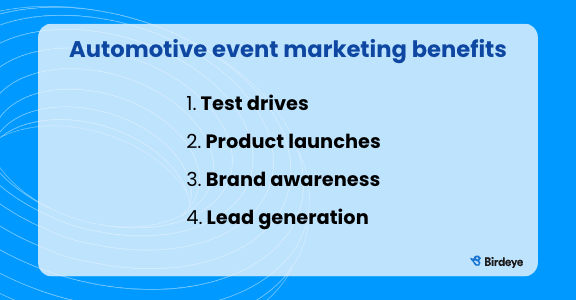
Event marketing can be an effective automotive marketing strategy for businesses looking to engage with their target audience in an interactive and memorable way.
Here are some of the ways that event marketing can benefit automotive businesses:
Test drives
Events provide an opportunity for automotive businesses to offer test drives of their vehicles, letting potential customers experience the product first-hand and increasing the likelihood of a sale.
Product launches
Events can also be used to launch new products or services, generating excitement and buzz among attendees and building anticipation for the business’s offerings.
Brand awareness
Participating in events can also be used to increase brand awareness and promote the products and services to a new audience. By creating an engaging experience, businesses can leave a lasting impression on attendees and generate word-of-mouth advertising.
Lead generation
Events can also be used to generate leads for the business, as attendees who express interest in the product can be followed up with after the event to convert them into customers.
Frequently asked questions about automotive marketing
An automotive marketer is responsible for developing and executing marketing strategies to promote a company’s automotive products and services. This includes creating campaigns, conducting customer and competitive research, leveraging digital channels for advertising, building relationships with key stakeholders, developing promotional materials, and managing budgets.
To successfully market in the automotive industry, it’s important to understand customer needs, stay up to date on competition and trends, create unique branded content, use data to measure performance and optimize campaigns, take advantage of digital channels and online advertising, and leverage influencer marketing where appropriate.
Automotive advertising is specifically aimed at promoting automotive products and services by creating digital and print campaigns, leveraging paid advertising, developing promotional materials such as videos, utilizing social media to reach target audiences, and conducting research on customer behavior.
Examples of vehicle marketing include: creating memorable taglines and slogans, using targeted digital campaigns such as PPC advertising, leveraging influencer marketing, engaging in email campaigns, offering incentives for test drives, and creating social media content to engage with customers.
Drive sales with automotive marketing
Automotive marketing is important for several reasons. It helps businesses to reach new audiences, build awareness and loyalty, generate leads and sales, engage with customers, and gather feedback. It also helps businesses identify new opportunities for growth and stay competitive in the industry.
To succeed in the competitive automotive industry, businesses must implement effective marketing strategies that resonate with their target audience. Take action and implement the strategies discussed in this post to rev up your revenue.

Originally published



